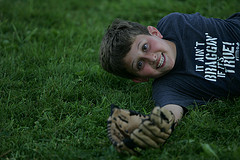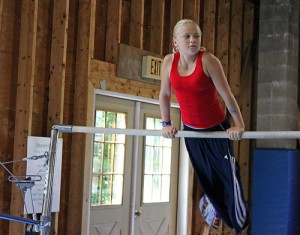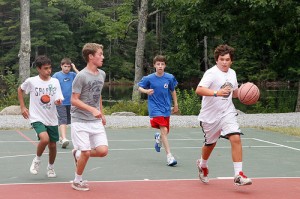 One thing that is essential to a successful summer camp experience is a solid summer camp program. Sure, summer camp is full of fun activities, but scheduling those activities throughout the summer so that every camper has equal opportunity and experience can be challenging. Some camps prefer to divide all of the daily activities equally among campers on a rotating schedule, while others place campers completely in the driver’s seat. Both styles of program options have benefits and, often, the type of camp program that is right for your child comes down to your child’s style and tastes.
One thing that is essential to a successful summer camp experience is a solid summer camp program. Sure, summer camp is full of fun activities, but scheduling those activities throughout the summer so that every camper has equal opportunity and experience can be challenging. Some camps prefer to divide all of the daily activities equally among campers on a rotating schedule, while others place campers completely in the driver’s seat. Both styles of program options have benefits and, often, the type of camp program that is right for your child comes down to your child’s style and tastes.
For many younger campers, especially first time campers, summer camp is about  familiarizing one’s self with the summer camp environment and making new friends. So they’re happy to have all or most of their daily activities choices scheduled for them. However, many older campers, and some younger more independent campers, prefer to make all or most of their own decisions about what they do on a daily basis. Fortunately, there is an array of camps that offer different types of scheduling that cater to campers’ programming needs.
familiarizing one’s self with the summer camp environment and making new friends. So they’re happy to have all or most of their daily activities choices scheduled for them. However, many older campers, and some younger more independent campers, prefer to make all or most of their own decisions about what they do on a daily basis. Fortunately, there is an array of camps that offer different types of scheduling that cater to campers’ programming needs.
A lot of camps offer a hybrid program; one that schedules some activities while giving campers the opportunity to choose their own activities for one or more activity periods. These types of programs, such as those offered at Camp Starlight and Camp Laurel, are popular with campers because they offer an element of  autonomy alongside structure. Some campers, however, are either not quite ready for the intensity of a specialized camp or prefer the offerings of a traditional summer camp but like having the freedom to choose their own daily activities. For these campers, there are summer camps that offer a complete option scheduling program that literally allows campers to choose what they do each day. Camp Laurel South (with a guided chocie program) and Camp Weequahic (whose motto is Your Sumer…Your Choice) are two camps that have found success with unique programming structures.
autonomy alongside structure. Some campers, however, are either not quite ready for the intensity of a specialized camp or prefer the offerings of a traditional summer camp but like having the freedom to choose their own daily activities. For these campers, there are summer camps that offer a complete option scheduling program that literally allows campers to choose what they do each day. Camp Laurel South (with a guided chocie program) and Camp Weequahic (whose motto is Your Sumer…Your Choice) are two camps that have found success with unique programming structures.
Deciding which is better for your children requires a close evaluation of their needs. Do your children want to enjoy the general environment of summer camp or is there a specific activity on which they’d like to focus? Do your children have a hard time making decisions? If so, then a camp program that makes most of their decisions for them, based on their personal interests, might be the best bet. But if your child is one who likes making independent choices, from what they eat for breakfast in the morning to the clothes they wear to school and how their bedroom is arranged, then a complete choice program might be better. It’s also important to keep in mind your reason for sending your children to camp. If it’s to experience new things, then a camp program that primarily rotates a prescribed set of activities amongst campers while giving them two or three choices will likely be a better choice. However, if you’re children have embraced summer camp as a way to spend more time doing a particular activity that they love or is more inclined to a particular sport or hobby, a complete options based program might be right for them.
Do your children want to enjoy the general environment of summer camp or is there a specific activity on which they’d like to focus? Do your children have a hard time making decisions? If so, then a camp program that makes most of their decisions for them, based on their personal interests, might be the best bet. But if your child is one who likes making independent choices, from what they eat for breakfast in the morning to the clothes they wear to school and how their bedroom is arranged, then a complete choice program might be better. It’s also important to keep in mind your reason for sending your children to camp. If it’s to experience new things, then a camp program that primarily rotates a prescribed set of activities amongst campers while giving them two or three choices will likely be a better choice. However, if you’re children have embraced summer camp as a way to spend more time doing a particular activity that they love or is more inclined to a particular sport or hobby, a complete options based program might be right for them.
Ultimately, deciding which program type is best for your children involves speaking with them and choosing a summer camp with a clear set of expectations about what you and they expect to take away from the experience.

 570-798-9831
570-798-9831